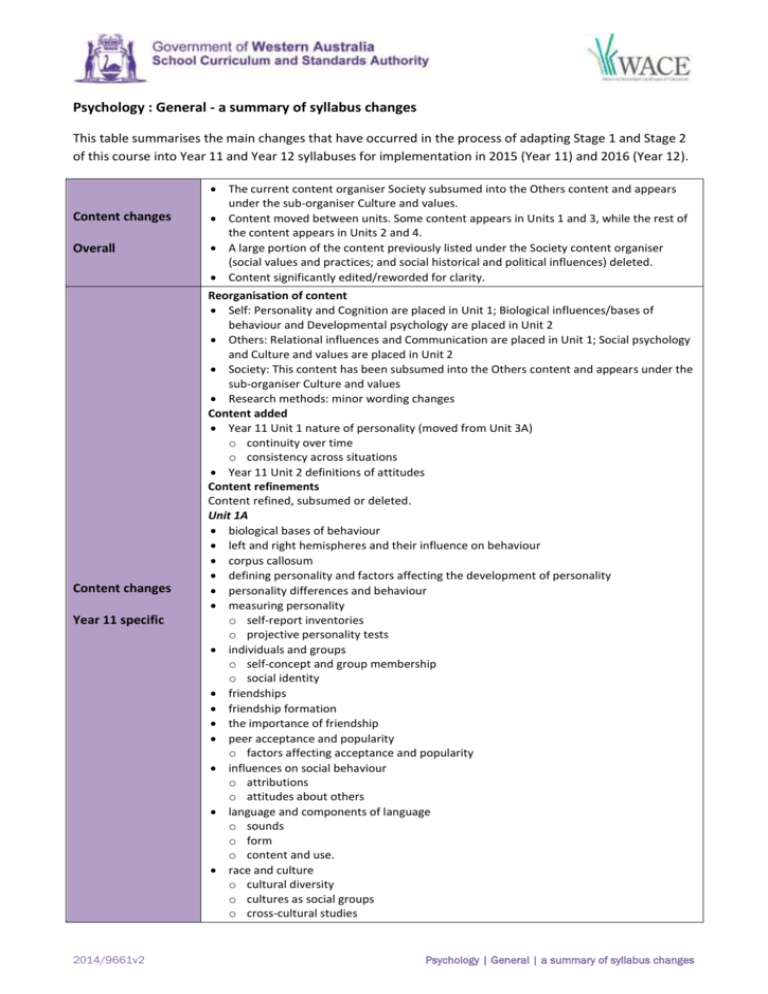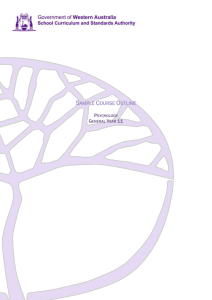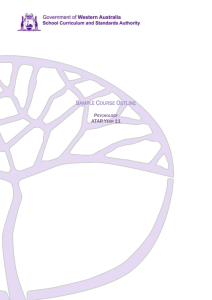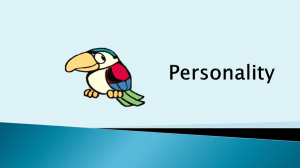Word Format - WACE 2015 2016
advertisement

Psychology : General - a summary of syllabus changes This table summarises the main changes that have occurred in the process of adapting Stage 1 and Stage 2 of this course into Year 11 and Year 12 syllabuses for implementation in 2015 (Year 11) and 2016 (Year 12). Content changes Overall Content changes Year 11 specific 2014/9661v2 The current content organiser Society subsumed into the Others content and appears under the sub-organiser Culture and values. Content moved between units. Some content appears in Units 1 and 3, while the rest of the content appears in Units 2 and 4. A large portion of the content previously listed under the Society content organiser (social values and practices; and social historical and political influences) deleted. Content significantly edited/reworded for clarity. Reorganisation of content Self: Personality and Cognition are placed in Unit 1; Biological influences/bases of behaviour and Developmental psychology are placed in Unit 2 Others: Relational influences and Communication are placed in Unit 1; Social psychology and Culture and values are placed in Unit 2 Society: This content has been subsumed into the Others content and appears under the sub-organiser Culture and values Research methods: minor wording changes Content added Year 11 Unit 1 nature of personality (moved from Unit 3A) o continuity over time o consistency across situations Year 11 Unit 2 definitions of attitudes Content refinements Content refined, subsumed or deleted. Unit 1A biological bases of behaviour left and right hemispheres and their influence on behaviour corpus callosum defining personality and factors affecting the development of personality personality differences and behaviour measuring personality o self-report inventories o projective personality tests individuals and groups o self-concept and group membership o social identity friendships friendship formation the importance of friendship peer acceptance and popularity o factors affecting acceptance and popularity influences on social behaviour o attributions o attitudes about others language and components of language o sounds o form o content and use. race and culture o cultural diversity o cultures as social groups o cross-cultural studies Psychology | General | a summary of syllabus changes Unit 1B relationship between brain and behaviour o phrenology o functions of the four lobes of the cerebral cortex o methods of studying the brain including EEG, CAT scan, PET scan and MRI. self-concept o concept of others and perspective taking the development of social cognition o trait approach—Allport o personality inventories and the measurement of personality o scientific investigation related to personality such as forensic psychology. group formation and group identity social psychology concepts o affiliation o social comparison o social identity o attitude formation research on attitude formation and group identity. roles within a relationship o conformity o obedience ways of communicating information to a range of audiences behavioural expectations in different cultural contexts o family roles o social conventions influence of different cultural attitudes on relationship formation such as child-rearing. social values o human rights o social justice o equity o diversity Content changes Year 12 specific 2014/9661v2 Reorganisation of content Self: Personality and Cognition are placed in Unit 3; Biological influences/bases of behaviour and Developmental psychology are placed in Unit 4 Others: Relational influences and Communication are placed in Unit 3; Social psychology, and Culture and values are placed in Unit 4 Society: This content has been subsumed into the Others content and appears under the sub-organiser Culture and values (above) Research methods: minor wording changes Content added Unit 4: cultural bias in developmental theories Content refinements Content refined, subsumed or deleted. Unit 2A impact of the presence of others on individual behaviour—social facilitation and inhibition socialisation processes observed within peer groups o associative o cooperative o adolescents—cliques and crowds socialisation processes observed within cult groups. obstacles to effective communication assertive communication. measurement of attitudes o observational methods o qualitative self-report methods—interviews and focus groups o quantitative self-report measures—rating scales impact of world events on individuals o positive responses—resilience and growth Psychology | General | a summary of syllabus changes o negative responses—post traumatic stress disorder o event characteristics related to stress—predictability; controllability; experience of threat or loss impact of world events on community wellbeing Unit 2B learning o classical conditioning o operant conditioning o observational learning o positive reinforcement o punishment and negative reinforcement behaviour modification o token economies o systematic desensitisation role of physical, cognitive, emotional and social readiness in skill development role of play status and power of individuals within group group influences on behaviour o compliance o peer selection o peer influence delayed and impaired communication skills—hearing impairment, autism strategies and interventions to improve communication. community empowerment o citizen participation o social justice o human rights winning and losing, and their psychological impact on individuals within communities o sport o gambling Changes to the assessment table Year 11 minor changes to wording in assessment table. production/Performance assessment type has been changed to Project. Changes to the assessment table Year 12 minor changes to wording in assessment table. production/Performance assessment type has been changed to Project. externally set task has been added. Changes to assessment type weightings Year 11 Changes to assessment type weightings Year 12 2014/9661v2 Existing (stage 1) Type Investigation Response Production/ Performance Examination Existing (stage 1) Type Investigation Response Production/ Performance Examination Weighting 20-30% 20-30% Revised for 2015/16 Type Weighting Investigation 30% Response 40% 30-40% Project 30% 0-20% Weighting 20-30% 20-30% Revised for 2015/16 Type Weighting Investigation 25% Response 40% 20-30% Project 20% 20-30% Externally set task 15% Psychology | General | a summary of syllabus changes







